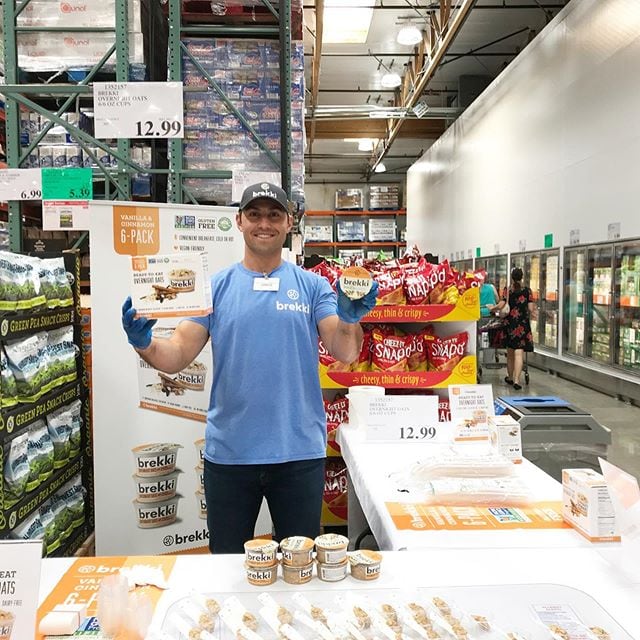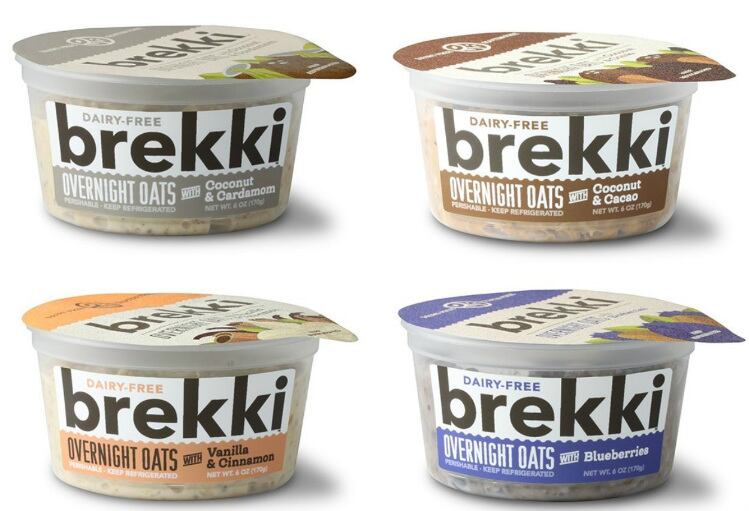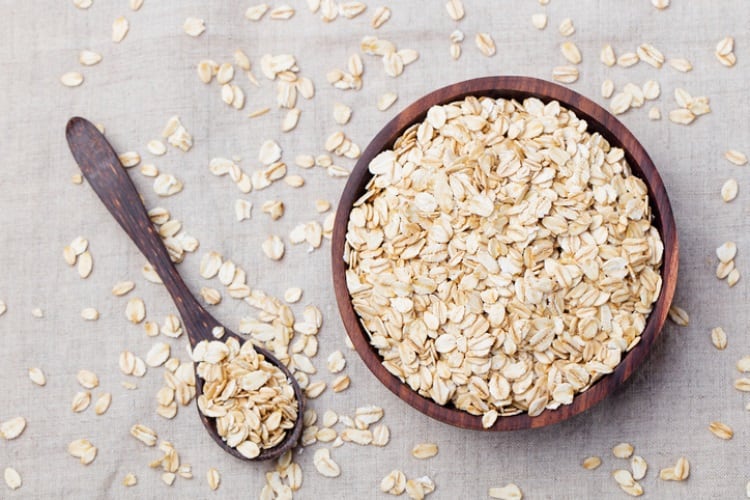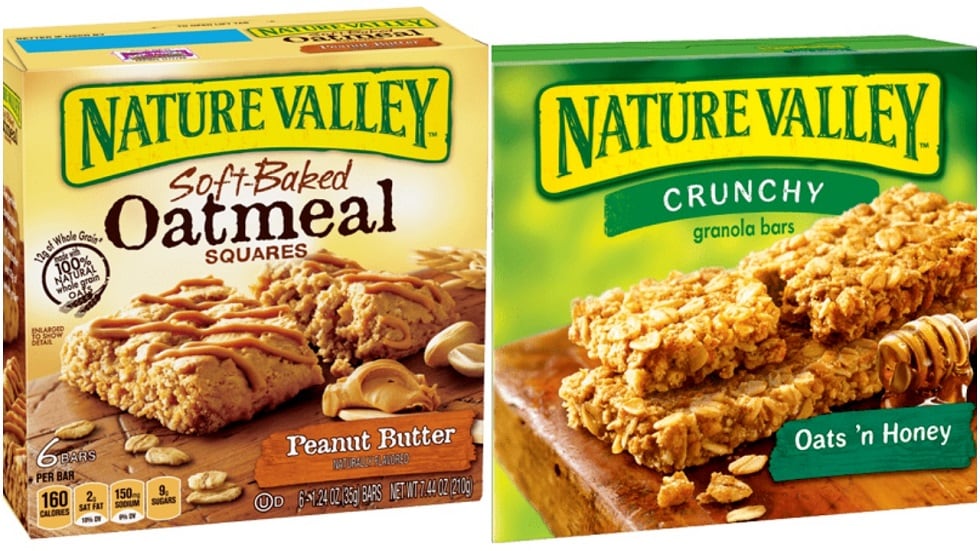In the US, oats have been riding high as “a white carb bucking the trend of carb-less meals,” but for the most part, they are stuck in bars – or in the pantry.
“Oats are in every pantry, but oftentimes they just sit there,” said Brekki founder Grey Peyser.
“The educational curve we thought was considerably less steep as we introduced this ‘oat-plus’ product. It’s not just an oat bowl – it’s a combination of oats and chia seeds and flax seeds and buckwheat groats,” which proffer a host of healthy fats, Omega-3’s, iron, potassium and fiber.
Brekki's 6oz cups also satisfy so many of today’s ‘healthy’ consumer demands: no dairy, no artificial flavors or colors, no soy. They can be eaten straight from the fridge or warmed in the microwave. They contain only a touch of coconut nectar for sweetness – eschewing the brown rice syrup, vegetable glycerin or other sweeteners commonly found in oat-based granola bars.
The product is made with oats that are non-GMO and glyphosate residue-free – a term Peyser believes will permeate the mainstream consciousness in due time.
“Our oats have not been desiccated by RoundUp,” he said, referring to the primary chemical of the ubiquitous weed killer RoundUp. The Monsanto product has been the subject of intense debate in recent years, with a jury awarding a California farmer damages for his exposure to the pesticide.
“Pepsi-Quaker can’t say that; Cheerios doesn’t have it, [nor does] General Mills. We believe it’s the future. It’s important for consumers to understand what it is.”
The Detox Project, a research and certification nonprofit, has affirmed Brekki’s products as glyphosate residue-free. The company submitted monthly reports for about two years before receiving the go-ahead in early 2019.
Peyser believes big companies will soon need to contend with this certification as the next Project Verified, the most prevalent non-GMO certification.
“Oats are really prevalent. It’s a really great starch and it’s really cheap,” he told BakeryandSnacks, but there is a “movement for a cleaner oat product.”
The thought is: oats have always been there. We’re sort of rejiggering this oat thing, making it as convenient as possible, and giving it to people [to eat] hot or cold. It was always stemming from healthy convenience and not another bar. All you have to do is peel the seal, stir and go. – Brekki founder Greg Peyser
Bringing Brekki to the masses
Since 2017, Peyser – who created Suja Juice – has been peddling Brekki bowls in a few Whole Foods in Southern California. This year, CostCo picked up the brand and expanded it across parts of its national network.
Now a father of three, he developed the concept after tasting Bircher muesli in Australia, but ultimately decided that ‘overnight oats’ would resonate with an American audience. The ‘healthy convenience’ of oats in a cup offers consumers a quick snack post-workout, at the desk or on-the-go that is not a bar.
Nutrition Facts for The Original Brekki
Per 6oz (one single-serve cup):
- 260 calories
- 11g fat, including 1g saturated fat
- 110mg sodium (6% daily value)
- 32g carbs (12% daily value)
- 5g fiber
- 8g sugar (0g added sugar)
- 8g protein
- 81mg calcium (6% daily value)
- 2mg iron (10% daily value)
- 304mg potassium (6% daily value)
Other flavors include Blueberry, Strawberry and Vanilla Cinnamon.
“I’m feeding this to my kids and that was the first consumer I really cared about,” he said.

It took some time to perfect the recipe, as oats sitting in a package tend to get mushy. Leaving crunchy ingredients (namely nuts) on top helped solve that problem. Almond milk enhances the creaminess, though Peyser said the brand is experimenting with other allergen-friendly milks.
“Could I match the creaminess of [Greek] yogurt? I thought I could, and I think we’re pretty close. I don’t miss the dairy. That’s part of the central experience when you eat it.”
On their own, he continued, “oats are boring – we’re trying to change the format.” Consumers will pay more for convenience. “The thought is, oats have always been there. We’re sort of rejiggering this oat thing, making it as convenient as possible, and giving it to people [to eat] hot or cold.”
Glyphosate as part of the Brekki conversation
The glyphosate-free element offers Brekki a chance to educate the consumer on another way to pursue a healthy lifestyle.
Moving forward, Peyser hopes to further the refrigerated snack category alongside brands like Perfect Snacks.
“We’re in that same section. It crosses that line between mini-meal and snack. We’re still trying to define that in the eyes of the consumer.”
He is also angling for a lower retail price (currently $3.99 each, $12.99 for a 6pk at Costco) as volume increases. Ideally, a single cup would run for an RRP of $2.49 and eventually $1.99 – but, he said, “what is our greatest strength also happens to be our greatest weakness.”
The cost of distributing refrigerated product “is very onerous.”

What do consumers notice when sampling new products?
Peyser has been involved with consumer food and drink brands for nearly a decade, and his father-in-law runs a vegetable farm in Southern California. His knowledge of the difference between organic and conventional exceeds that of the average consumer, but “most people, even in the [food] industry, don’t truly understand it,” he told BakeryandSnacks.
His experience was extended by standing in the aisles of Costco for 10 hours a day for 15 days straight. “Basically you see every swatch of culture, of socioeconomic status, and what you see is no one – not rich nor poor – knows what the hell is going on. You get a very, very small portion of people – less than 1% – who even care about what you’re selling them. They really care about one thing and that’s price. That’s the reason why the chip aisle is decimated at the end of the day.”
When consumers do show interest in ingredients or certifications, they tend to look for organic and gluten-free claims. In his experience, seldom do they care deeply about non-GMO, due in part to a lack of knowledge on the intricacies of the subject. More than anything else, consumers care about sugar.
The new 'kid on the block', glyphosate-free, has yet to permeate the mainstream.
“Very few people even ask about it,” said Peyser, but he believes they will eventually have a “philosophical change of heart” to understand “the stuff that is actually killing people.”
Glyphosate lawsuits
Researchers at the University of Texas at Austin found glyphosate might be contributing to the declining population of honey bees. Bayer, which acquired Roundup manufacturer Monsanto in 2018, rejected the findings, based in part on the small-scale nature of the study.
Meanwhile, a California jury awarded $2bn in damages to a couple who contracted non-Hodgkin lymphoma (though a judge has vowed to cut the number to $250m). In two other cases, also in California, jurors sided with plaintiffs who had used Roundup and developed the same cancer.
In April, the US Environmental Protection Agency (EPA) concluded glyphosate contains “no risks to public health… when used in accordance with its current label… and is not a carcinogen.”
The European Union approved glyphosate as an acceptable herbicide for plant protection through 2022. The European Commission reviews the approval of such products every five years.



